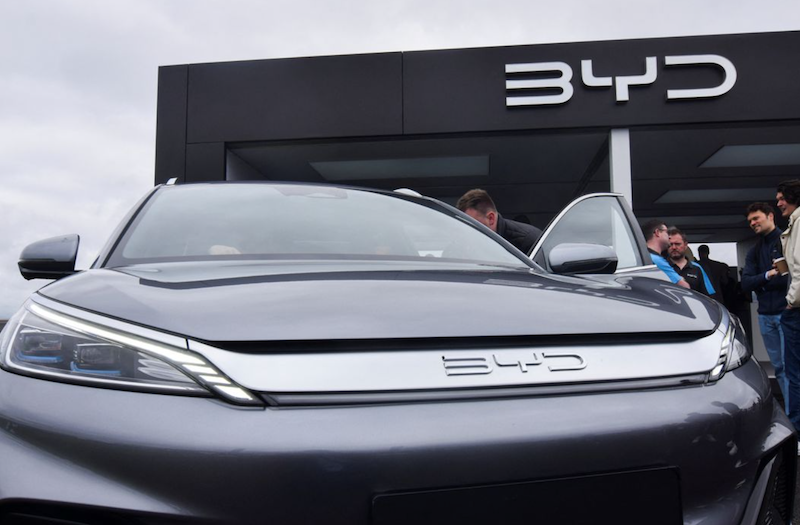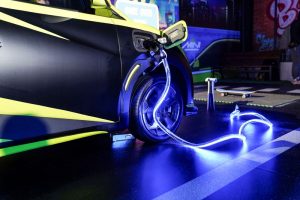Canada is considering imposing tariffs on imports of China-made electric vehicles amid similar moves by key allies and increasing pressure from domestic manufacturers.
“Chinese producers are quite intentionally generating a global oversupply that undermines EV producers around the world, including here in Canada,” Finance Minister Chrystia Freeland said, echoing concerns raised by allies United States and the European Union.
Canada’s domestic auto sector faced unfair competition from China’s “state-directed policy of overcapacity,” Freeland added.
Also on AF: EU And China Agree to Negotiations on EV Tariffs, Minister Says
Freeland declined to detail what Ottawa’s potential action would be or if it would also involve EV components like batteries and critical minerals.
“We’re not ruling anything out,” she said, adding “we are bringing to bear our strongest trade action tools.”
Ottawa will open a 30-day public consultation period on July 2 on possible responses.
Pressure building
Industry bodies, including the Global Automakers of Canada and the Canadian Vehicle Manufacturers’ Association, welcomed Freeland’s announcement.
Canada is looking to position itself as a critical player in the global EV push, and has stepped up efforts to woo companies involved in all parts of the supply chain.
Ottawa has inked deals worth billions of dollars to bolster the country’s manufacturing heartland.
Amid that push, it has come under increasing pressure domestically to act against Chinese EVs.
The premier of Ontario, Canada’s most populous province and the main auto-making centre, last week urged Ottawa to impose tariffs of at least 100% on the vehicles.
Meanwhile, following Freeland’s announcement, the CEO of Canadian firm Northern Graphite, Hugues Jacquemin, said any potential action limited to EVs would not be enough. Ottawa should also include critical minerals essential for battery production, he said.
The main opposition Conservative party accused Trudeau of failing to protect the auto industry. It said Ottawa should not allow the dumping of cheap Chinese products.
China asks Canada to remain ‘rational’
China is Canada’s second-largest trading partner, although it trails far behind the United States. Data from Canada’s largest port in Vancouver show imports of automobiles from China at the port jumped 460% annually in 2023, when Tesla started shipping Shanghai-made EVs to Canada.
But China has consistently rejected accusations of unfair subsidies or that it has an over capacity problem.
Speaking at a World Economic Forum meeting in Dalian on Tuesday, Chinese Premier Li Qiang said the “rapid rise of China’s new industries is rooted in our own unique comparative advantages.”
“China’s production of advanced electric vehicles, lithium-ion batteries and photovoltaic products, etcetera, first met our domestic demand, but also enrich global supply,” Li said.
Li’s remarks were a reiteration of Beijing’s stance that simply decided to invest in green technologies earlier, and that recent tariff increases by the US and Europe are unjustified.
In an opinion piece in the Chinese state-backed Global Times newspaper, ahead of Freeland’s announcement, advocated for “Canada to remain strategically rational.”
It called on Canada to not “sacrifice normal economic exchanges with China for the sake of Washington’s strategic selfishness.”
- Reuters, with additional editing by Vishakha Saxena
Also read:
China EV-Makers Eat Into Japan, Korea’s Markets in SE Asia
China EV Firms Scaling Back European Plans Over Subsidy Probe
European Farmers Fear Trade War With China Over EV Tariffs
Chinese Carmakers Call For 25% Retaliatory Tariffs on EU Cars
China’s Probe Into EU Pork ‘Dumping’ Seen as Trade Retaliation
EU Tariff Fallout: China Warns of WTO Suit, Tesla to Hike Prices
Biden Ramps US Tariffs on Chinese EVs, Metals, PV Cells, Chips
US to Target Chinese Connected Cars Over National Security
























